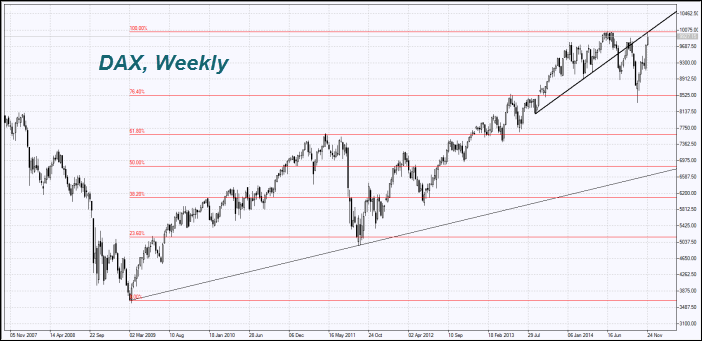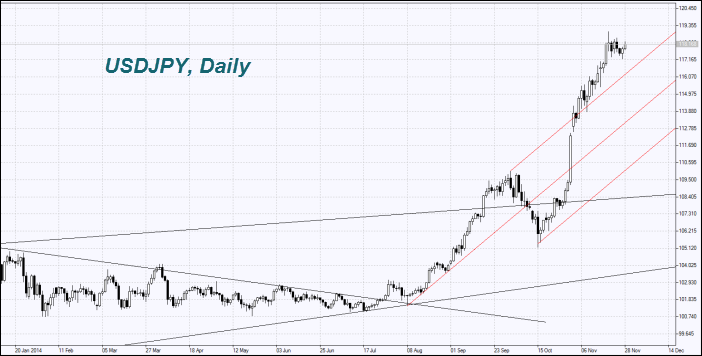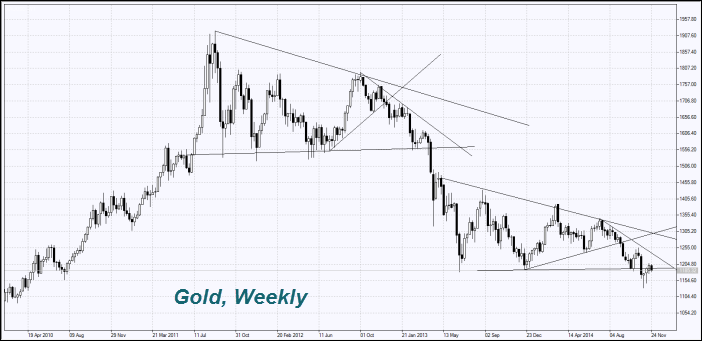By IFCMarkets
Yesterday the United States celebrated the public holiday, Thanksgiving Day. European markets rose. Market participants had a positive reaction to OPEC’s decision to leave oil output as it was. Oil prices have tumbled about $6 per barrel: it would reduce significantly the expenses of European companies.

An additional growth factor was the fallen German inflation rate in November. This improves the chances of an early start of the ECB money printing. Investors believe that part of that money would flood into the stock market one way or another. Therefore, euro has slipped. This morning European markets are slightly down expecting the data on inflation and unemployment for the EU. The data will be released at 10-00 СЕТ. It was also caused by the negative stock price change of European oil and energy companies, and Aurubis AG stocks slumped 7% due to the Goldman Sachs forecast revised downward. Note that significant macroeconomic data is not expected today in the US.

Nikkei dipped on Thursday as it was traded before the OPEC decision. Today it has climbed. It added 6.4% in November, the most significant rise over 12 months. Another positive factor for the Japanese stock market was the yen weakening and the economic data released this morning. Industrial production in October increased 0.2% compared to September. It was expected to fall 0.6%. Unemployment rate was 3.5%, slightly better than expected. Inflation rate in October fell to 2.9% yoy, compared to 3% in September. Growth in consumer prices in Tokyo in November was also less than expected. In theory, this allows the Bank of Japan to continue money issuing, which depreciates the yen. According to the BOJ, if not taking the sales tax hike in April into account, CPI was only 0.9% last month, instead of 2.9% stated in official statistics. The BOJ inflation target amounts to 2%. Note that yen weakening was moderate yesterday as the Bank of Japan announced plans to cut the purchases of short-term government bonds in December.
Previously, we have repeatedly pointed out that fallen world crude oil prices is coherent with anti-Russian Western sanctions. The US increased its own oil output up to 9.08 million barrels per day, the record high since 1983. Oil priced tumbled 37% since June. The CEO of Russia’s largest oil company Rosneft Igor Sechin accept the possibility of Brent crude oil prices may be falling to $60 per barrel and lower by the middle of next year. In this case, Russia can reduce the production by 200-300 thousand barrels per day. Note that at the last OPEC meeting, Venezuela and Algeria called for the output cut of 2 million barrels per day. That means Russia is unlikely to affect oil prices without OPEC. The organization produces 30.97 million barrels per day and provides 40% of world exports. Russian ruble falls against the US dollar as global oil prices are going down: it can be used for trading.
According to Olam International forecast, the global shortage of cocoa in 2014/2015 would reach the level of 120 thousand tons due to the reduced crop in Ivory Coast to 1.15 million tons, compared to 1.23 million a season earlier, and in Ghana – 625 thousand tons vs. 735 thousand.
Free Reports:
 Get Our Free Metatrader 4 Indicators - Put Our Free MetaTrader 4 Custom Indicators on your charts when you join our Weekly Newsletter
Get Our Free Metatrader 4 Indicators - Put Our Free MetaTrader 4 Custom Indicators on your charts when you join our Weekly Newsletter
 Get our Weekly Commitment of Traders Reports - See where the biggest traders (Hedge Funds and Commercial Hedgers) are positioned in the futures markets on a weekly basis.
Get our Weekly Commitment of Traders Reports - See where the biggest traders (Hedge Funds and Commercial Hedgers) are positioned in the futures markets on a weekly basis.

Gold prices drop for three days in a row. Meanwhile, a Swiss referendum on increasing gold in state reserves from 8% to 20% will be held in Switzerland on Sunday, November 30.
Note that Bloomberg Commodity Index slumped to the record low since July 2009. Some investors deem that cheap oil may cause deflation and have a negative impact on commodity prices.
Market Analysis provided by IFCMarkets